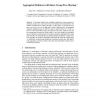Free Online Productivity Tools
i2Speak
i2Symbol
i2OCR
iTex2Img
iWeb2Print
iWeb2Shot
i2Type
iPdf2Split
iPdf2Merge
i2Bopomofo
i2Arabic
i2Style
i2Image
i2PDF
iLatex2Rtf
Sci2ools
106
Voted
NGC
2001
Springer
2001
Springer
Aggregated Multicast with Inter-Group Tree Sharing
IP multicast suffers from scalability problems for large numbers of multicast groups, since each router keeps forwarding state proportional to the number of multicast tree passing through it. In this paper, we present and evaluate aggregated multicast, an approach to reduce multicast state. In aggregated multicast, multiple groups are forced to share a single delivery tree. At the expense of some bandwidth wastage, this approach can reduce multicast state and tree management overhead at transit routers. It may also simplify and facilitate the provisioning of QoS guarantee for multicast in future aggregated-flow-based QoS networks. We formulate the tree sharing problem and propose a simple intuitive algorithm. We study this algorithm and evaluate the trade-off of aggregation vs. bandwidth overhead using simulations. Simulation results show that significant aggregation is achieved while at the same time bandwidth overhead can be reasonably controlled.
| Added | 30 Jul 2010 |
| Updated | 30 Jul 2010 |
| Type | Conference |
| Year | 2001 |
| Where | NGC |
| Authors | Aiguo Fei, Jun-Hong Cui, Mario Gerla, Michalis Faloutsos |
Comments (0)

